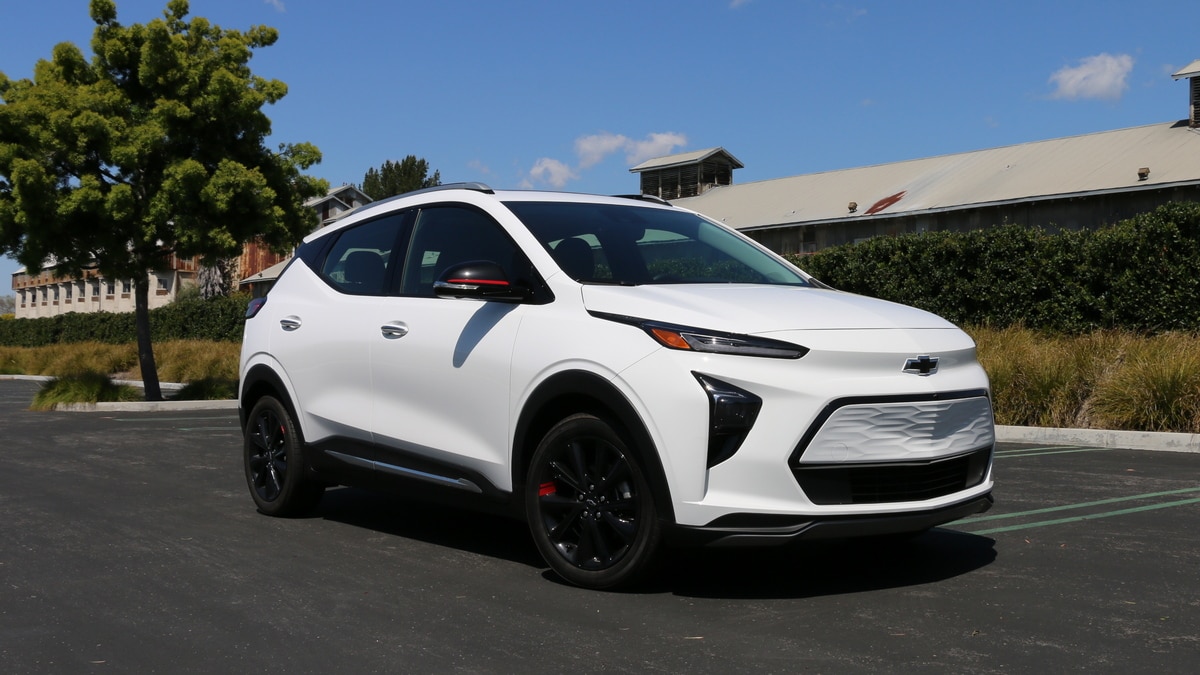Chevrolet will soon introduce a new version of its low-cost Bolt electric vehicle (EV). To keep it affordable, the next-generation Bolt will use a different type of battery than other GM EVs, but not the battery found in the current car.
A Sales Success Story
Chevy has had an on-again, off-again relationship with its best-selling EV. Today’s Bolt comes as both the Bolt EV hatchback and the Bolt EUV. The EUV is a stretched Bolt with a marginally higher price in exchange for more rear-seat legroom and cargo space.
They’re sometimes considered two separate cars, but Chevrolet reports sales as if they are one.
The Bolt has been the third-best-selling electric car in America and the best-selling EV not built by Tesla in 2023.
But A Long Recall Saga Over the Old Batteries
But it has also had a somewhat checkered history. In 2021, Chevrolet was forced into an escalating series of recalls thanks to several fires blamed on Bolt batteries.
At various points, GM warned owners to park their vehicles outside, at least 50 feet from other cars and recommended they not allow the battery to drop below 70 miles of range. This left owners with severely reduced range — unable to fully charge their cars or drive them for the limited remaining capacity.
That battery, we should note, is different from the batteries found in all other GM EVs. We know of no unusual pattern of fires in cars carrying the Ultium battery found in GM’s other electric vehicles.
The company ultimately replaced many Bolt batteries and recently offered a cash settlement to owners who didn’t get battery replacements.
That left company leaders with a hard decision – abandon the best-selling electric car not built by Tesla or keep it around despite a troubled past?
They went each way at least once. Chevy announced the cancelation of the Bolt in April. Then, it backtracked and promised a new Bolt with different battery technology in July.
On an earnings call with reporters this week, GM CEO Mary Barra finally offered some clarity.
Reborn With Different Batteries
“We’re leveraging the strong customer enthusiasm that people have for the Bolt EV” by building a new version, Barra said. “We are saving billions in capital and engineering expenses, delivering a significantly cost-improved battery pack using purchased LFP cells.”
That means GM won’t build the batteries themselves but will buy them from an outside supplier. And they’ll be lithium-iron-phosphate (LFP) batteries – a technology GM has never used. LFP batteries are less expensive than the nickel-cobalt-manganese-aluminum found in Ultium cells or the high-nickel lithium blend used in the recalled Bolt EVs.
LFP batteries don’t charge as quickly as other battery chemistry blends. But they’re appearing more in low-cost EVs and probably make sense for a small hatchback few shoppers buy with plans to drive it extraordinary distances often.
Car Shopping In The EV Era Will Be Different
And no, if you’re shopping for an EV, this doesn’t mean you need a chemistry degree. It simply means that Chevrolet may find a way to deliver another low-cost EV even after its Equinox EV came in at a higher price than the company had hoped.
And it may signal a new reality about car shopping in the EV era.
Discussions about whether EVs are good or bad cars often focus on range. But Americans buy cars as tools and different tools serve different needs. A tiny hatchback with a cheaper, less capable battery is like a small car with a three-cylinder engine – not the right solution for everyone, but exactly right for some shoppers.
These are the early days of the EV era, and we’re all getting used to what’s normal. We may be as likely to see several types of batteries in a showroom a decade from now as we are to see 4, 6, and 8-cylinder engines today.








